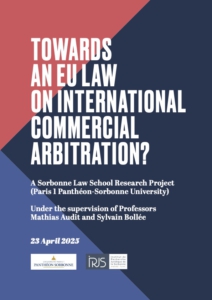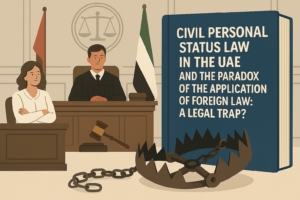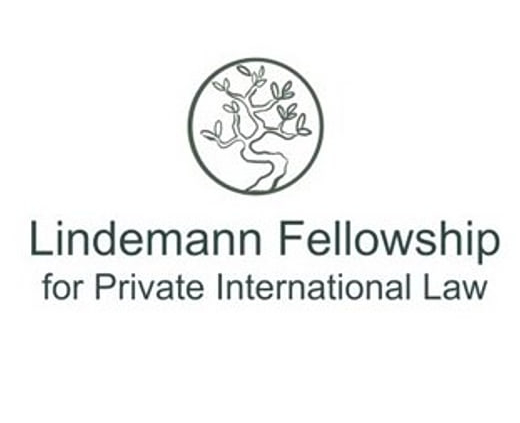Views
“Towards an EU Law on International Commercial Arbitration?” A Sorbonne Law School Research Project

Written by Dr. Nima Nasrollahi-Shahri (Sorbonne Law School) and Vincent Bassani-Winckler (PhD Candidate, Sorbonne Law School), both authors participated in the Working Group.
A few days ago, the Sorbonne Law School released the final report of a collective research project chaired by Professors Mathias Audit and Sylvain Bollée, entitled “Towards an EU Law on International Commercial Arbitration?”.
Conducted within the IRJS (Institut de Recherche Juridique de la Sorbonne), and more specifically its research group on private international law, SERPI (Sorbonne – Étude des Relations Privées Internationales), this project sets out to examine whether and how to improve the relationship between commercial arbitration and EU law.
Civil Personal Status Law in the UAE and the Paradox of the Application of Foreign Law: A Legal Trap?

I. Introduction (*)
(*) For the sake of simplicity, reference will be made only to Federal Decree-Law No. 41/2022 of 2 October 2022 on Civil Personal Status. The Emirate of Abu Dhabi has enacted a separate law that addresses similar matters at the local level. For a comparison of the various applicable legal frameworks in family law in the UAE, see Béligh Elbalti, “The Personal Status Regimes in the UAE — What’s New and What Are the Implications for Private International Law? A Brief Critical Appraisal”.
There is no doubt that the introduction of the Civil Personal Status Law (CPSL) in the United Arab Emirates marks a significant turning point in the region’s legal landscape, particularly in areas traditionally governed by religious norms. The CPSL refers to the special law adopted at the federal level, which allows family law disputes involving non-Muslims (both foreigners and UAE citizens) to be resolved under a legal framework, that is intended to be modern, flexible, based on “rules of justice and fairness” and “the best international practices from comparative legal systems” (cf. article 19 of the Cabinet Resolution Concerning the Executive Regulation of Federal Decree-Law on the Civil Personal Status). However, the incorporation of the CPSL into the existing legal frameworks in the UAE has raised several issues. These include, among others, the articulation of the CPSL with the other applicable legal frameworks, and more importantly, the extent to which parties may opt out of this “modern” regime in favor of applying their own national laws (for a general overview, see Elbalti, op. cit.). Read more
Report on the ABLI/HCCH 4th Joint Webinar on “Cross-Border Commercial Dispute Resolution – Electronic Service of Documents and Remote Taking of Evidence“
by Achim Czubaiko-Güntgen, Research Fellow („Wissenschaftlicher Mitarbeiter“) and PhD Candidate, supported by the German Scholarship Foundation, Institute for German and International Civil Procedural Law, University of Bonn.
With the fourth instalment in their ongoing webinar series on “Cross-Border Commercial Dispute Resolution”, the Asian Business Law Institute (ABLI) and the Hague Conference on Private International Law (HCCH) returned to the topic of “Electronic Service of Documents and Remote Taking of Evidence”. Contrary to the first webinar in 2021, this session focussed not solely on the HCCH 1970 Evidence but equally on the HCCH 1965 Service Convention. Having finally overcome the immediate constraints of the Covid-19 pandemic, this time the renowned speakers were able to elaborate more on the long-term development and visions in the practice of the two legal instruments with regard to their respective areas of law.
News
HCCH Monthly Update: September 2025
HCCH Monthly Update: September 2025
Conventions & Instruments
On 18 September 2025, Argentina deposited its instrument of ratification of the 1996 Child Protection Convention. With the ratification of Argentina, the Convention now has 58 Contracting Parties. It will enter into force for Argentina on 1 January 2026.More information is available here.
Meetings & Events
On 11 and 12 September 2025, the Permanent Bureau of the HCCH hosted a Roundtable and Training on the application of the 1980 Child Abduction and 1996 Child Protection Conventions, in particular concerning the children of Ukraine. More information is available here.
From 17 to 19 September 2025, the Experts’ Group (EG) on Central Bank Digital Currencies (CBDCs) held its fourth working meeting. Pursuant to its mandate, the EG made further progress on the study of the applicable law and jurisdiction issues raised by the cross-border use and transfers of CBDCs. More information is available here.
On 25 and 26 September, the Permanent Bureau of the HCCH hosted training on the HCCH’s core family law Conventions and projects for a group of judges and court officials from 16 States. The training was organised in cooperation with the European Judicial Training Network. More information is available here.
On 26 September 2025, the second meeting of the Working Group (WG) established to finalise the Model Forms pertaining to Chapter II of the 1970 Evidence Convention was held online.
Upcoming Events
Registration is now open to the public for online participation in the “HCCH-IDLO Dialogue on Digitalisation of Public Services and Justice”. The event will be held on Friday 10 October 2025, from 10.00 to 11.30 a.m. (CEST). Interested persons should register no later than Tuesday 7?October 2025 via this registration form. More information is available here.
Vacancies
Applications are now open for the position of Legal Officer. The deadline for the submission of applications is 1 November 2025. More information is available here.
Applications are now open for the position of Finance / Human Resources Assistant. The deadline for the submission of applications is 11 October 2025. More information is available here.
These monthly updates are published by the Permanent Bureau of the Hague Conference on Private International Law (HCCH), providing an overview of the latest developments. More information and materials are available on the HCCH website.
Call for Applications: Lindemann Fellowship for PIL
The University of Hamburg has announced its second Call for Applications for the Lindemann Fellowship for Private International Law. Eligible are researchers based in Europe who recently completed or are close to completing their PhD studies, with a main research focus on conflict of laws and/or international civil procedure.
Becoming a Lindemann Fellow means having a 3-year grant within a vibrant European network, fully funded annual meetings to present and discuss your research, and publication in an open-access collected volume.
More information about the Fellowship is available at the webpage: https://www.jura.uni-hamburg.de/duden/60-fellowship-lindemann.html
Applications (combined into a single PDF) must be submitted by 1 November 2025 to lindemann-fellowship@uni-hamburg.de.
The White Paper on Digital Product Passports and Critical Raw Materials for Batteries: Legal Conflicts and Principles for Cross-Border Cooperation
The White Paper on “Digital Product Passports and Critical Raw Materials for Batteries: Legal Conflicts and Principles for Cross-Border Cooperation” is now formally published on the UNECE website!
The United Nations Economic Commission for Europe White Paper identifies and analyses the critical legal challenges in implementing Digital Product Passports (DPPs) for Critical Raw Materials (CRMs), including cobalt, copper, lithium, and nickel. These materials are essential for Energy Transition, for example, electric vehicles.
Yet, tracing their journey from mines to markets to recycling is legally complex and globally inconsistent. This fragmentation hinders sustainability and transition to circular economy.
The White Paper provides policymakers and businesses with: An analysis of conflicting legal frameworks in implementing DPPs; Guiding principles for cross-border cooperation in CRM-Battery value chains.
Read the full White Paper here.




